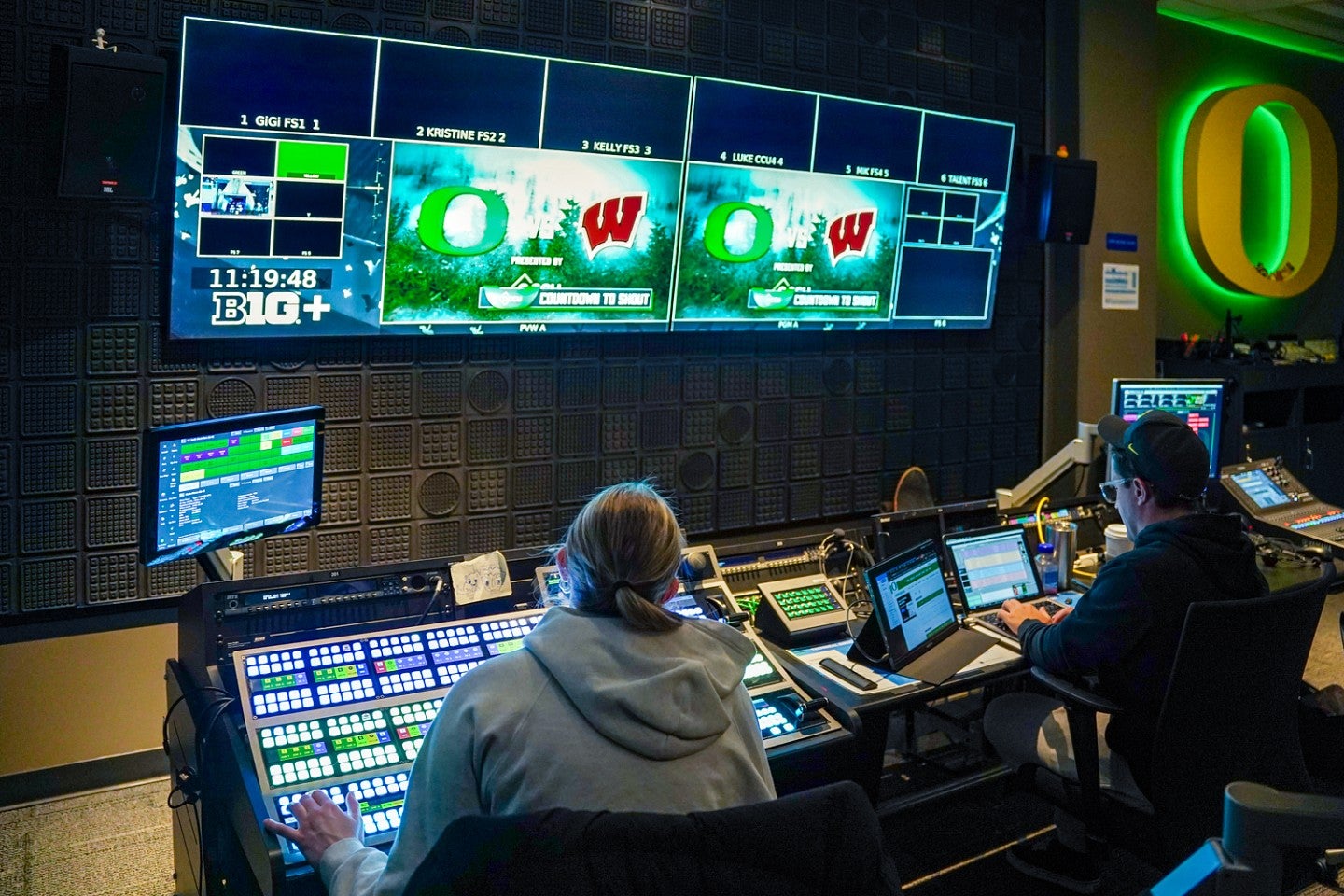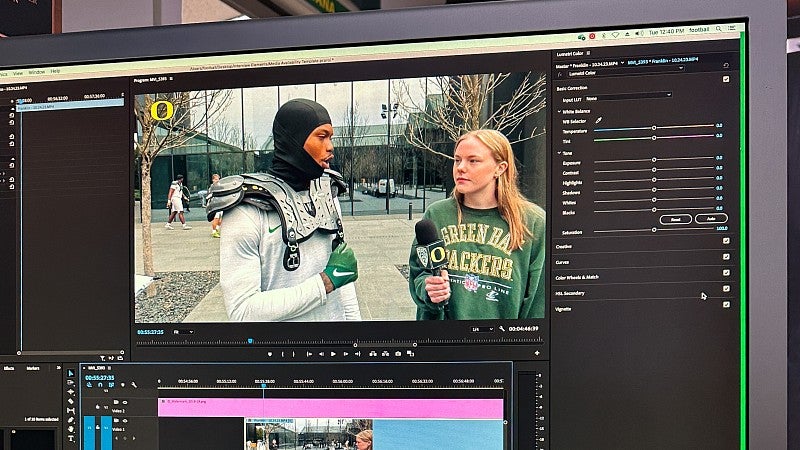From a nerve center miles away, SOJC student Sophie Fowler controls the live action you see at Autzen Stadium during Ducks games.

By Sophie Fowler, Class of ’26
If you’re at Autzen Stadium for a Ducks football game this season, make sure to look up at the jumbotron to watch me work.
You won’t see me on the sidelines or in the press box — and certainly not on the field. In fact, I won’t even be in the stadium.
I’m across the river, in the basement of Matthew Knight Arena, working in the broadcast control room, where the Quack Video crew makes sure the video feed runs smoothly. I’ll be sitting at a switcher pressing buttons to change cameras, auto-dissolving images into graphics and pulling up replays during the game. Everything I do at the switcher is what you see on the jumbotron at Autzen Stadium.
I am the glue of video production — otherwise known as the technical director.
As technical director, I put into action what the director and producer want in their show. That might be a camera switch, a replay wipe or a graphic showing team or player stats. I communicate with replay, graphics and camera operators to ensure the production is clean and working as it should.
But what looks like an effortless job of switching cameras comes from years of practice, patience, preparation and, occasionally, failing.
What goes into the role of technical director for Ducks football
While I’m at the controls during a Ducks football game, up to 60,000 people will be watching the board at some point, so I have to stay focused.
That’s why I arrive at the arena five hours early to prepare the switcher for game day and work with my director to make sure graphics are sharp, replay wipes work, cameras are up and everything is where it needs to be.
Two hours before the coin toss, I’m seated at the switcher and ready to go for pregame coverage. Once the football team runs out onto the field, it’s a busy schedule of prerecorded videos, fan shots and sponsor messages until kickoff. Football is a huge event at the UO, and it draws lucrative sponsors, so it’s important to make sure sponsor logos and messages appear as scheduled.
When the game begins, I’m locked in, switching from cameras to replays to graphics and videos until the game ends. Even during halftime shows, I’m busy switching cameras from members of the band and other performers to crowd shots — and finding time for a quick run to the bathroom.

How I got this Ducks football broadcasting job
This is not my first time in this role, but it is my first season at the controls of the jumbotron, a role I had to earn.
I joined UO Athletics’ Quack Video as a student in the UO School of Journalism and Communication (SOJC) at the end of my freshman year, before UO was in the Big Ten Conference. I knew nothing about video production back then. Now I work two to four sporting events a week — depending on the season — producing, directing or technical directing for the Big Ten Plus streaming service.
I started out working in less stressful roles, such as operating the game camera or videoboard for volleyball games. I gradually moved into roles of greater responsibility as I learned more and gained experience. At the start of my second year, I moved into faster-paced jobs, such as technical directing for volleyball and basketball live streams.
When UO moved to the Big Ten Conference, we joined the Big Ten StudentU. Now the majority of sports games broadcast on Big Ten Plus are produced and directed by students who gain valuable video production skills. We partner with KWVA sports to get students to work as analysts or color or sideline reporters for most Oregon sports.
When persistence and hard work pay off
After months of asking my bosses if I could work football games, I finally got the opportunity this year. Like many of you, I’m a Ducks football fan and have always loved attending games at Autzen with my friends. Now I watch from the bowels of Matthew Knight Arena. But I don’t miss going to the games because I am pursuing my dream of working as a technical director for football.
The opportunity to work with Quack Video has given me the experience of something that used to scare me: failure.
As much as you prepare the day before, you never know what’s going to happen until you’re working. You need to know what to do if x, y or z happens. We’ve had problems with rain inside cameras, buttons not working properly and technology freezing up.
When these situations happen, you need to be quick on your feet to find a solution so viewers at home don’t see the mistake or you fix it quickly to ensure the live stream isn’t too messed up.
Although I feel confident in what I’m doing, I’ve clicked the wrong buttons countless times, and I’ve missed peak moments in sports. During a live production, you have to learn to recover from your mistakes. It sucks, and you feel terrible, but you have to keep going and focus not on what you did wrong but on how you’ll avoid the mistake next time.
It’s an honor to be a student working the videoboard of one of the biggest sporting events in the state. I am grateful to my bosses in the program who have patiently helped me learn and grow my broadcast production skills and who have given me the opportunity of a lifetime.
Sophie Fowler, class of ’26, is a fourth-year journalism major with a minor in art and tech. She is a member of Duck TV, editor-in-chief for Ascend magazine, a student in the Clark Honors College, and an intern with Quack Video and the SOJC Communications team. She worked for the Redmond Spokesman as a Charles Snowden Program for Excellence in Journalism intern and also interned for TrackTown USA. You can connect with her on LinkedIn.



